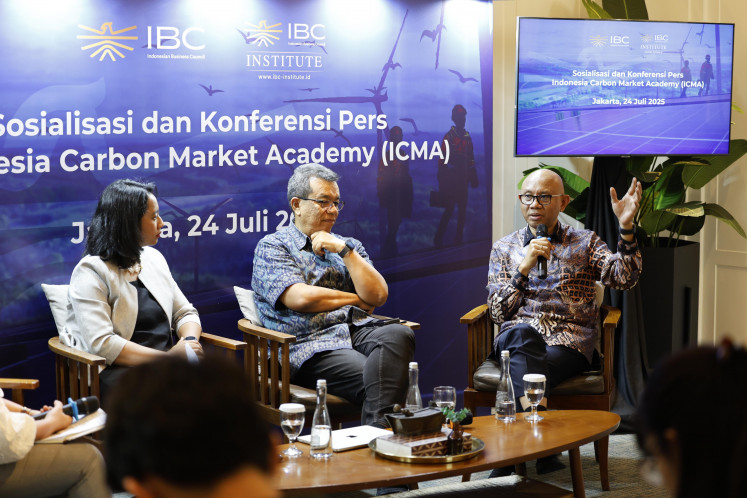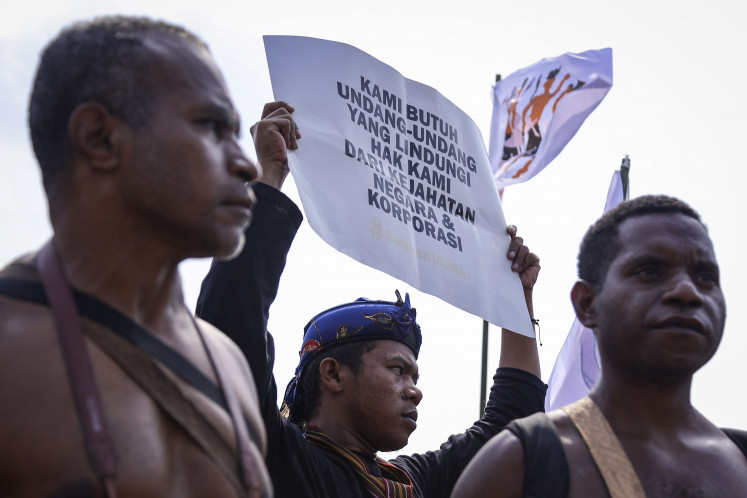Popular Reads
Top Results
Can't find what you're looking for?
View all search resultsPopular Reads
Top Results
Can't find what you're looking for?
View all search resultsWhither Indonesian social scientists?
In line with the low number of international scientific publications, academics and social science researchers in Indonesia are much more easily tempted by the instant popularity gained from the mass media.
Change text size
Gift Premium Articles
to Anyone
T
here are still too few social scientists in Indonesia contributing to knowledge production at the global level. Compared to its neighboring countries, there is a huge difference in the number of international publications.
Based on the Scimago Journal Rank 2014, Indonesian social scientists produced only 488 documents in 2014, far below Malaysia ( 2,056 ), Singapore ( 1,160 ) and Thailand ( 585 ). This is in accordance with the fact that most academic works about Indonesia are written by foreign scholars who are spread throughout the world in many Asian research centers such as in Australia, the US, Japan, the Netherlands and Canada. It seems that we cannot explain ourselves since other people do that for us.
In line with the low number of international scientific publications, academics and social science researchers in Indonesia are much more easily tempted by the instant popularity gained from the mass media.
Appearing on television shows with politicians and officials or making statements in various print and online media outlets is often seen as a measurement of success for a public intellectual. This is not surprising since the status as a popular analyst can also be capital to obtain professional offers as a consultant for political parties or for international funding agencies, or even as a public official.
Unfortunately, too few of the comments made by the analysts are based on serious research, especially that which is published in international journals. Moreover, since academic publication is still very weak, the expertise of social and political analysts is often determined by their popularity in the mass media rather than from international academic reputation.
There is a view that the above conditions occur due to the inadequate remuneration for research that follows international standards ( see Hadiz 2015 ). As a result, it is not surprising that such phenomena emerge and that much research is project oriented, while the academic contribution to international literature is minimal.
Yet in recent years, the Research, Technology and Higher Education Ministry has provided research funding as an incentive for international journal publication. However, the number of social science publications increased by only about 200 documents when the policy was enacted from 2011 until 2014.
In the same period in Malaysia, it rose by more than 500 documents and in India up by more than 1,000 papers ( see Scimago Journal Rank 2014 ).
Similar policies have also been tried by several universities, including by providing incentives for lecturers if they can publish their papers in international journals or at least in a national-accredited journal. However, without an endeavor to build a culture of conducting serious research and writing among lecturers and researchers, such policies are unlikely to increase the number of publications.
There are two main reasons for the low contribution of Indonesian social scientists. First, the situation cannot be separated from the bureaucratization during the New Order that forced the orientation of knowledge production in universities merely to serve the interests of the state and the capitalist class.
A career as an academic was also measured based on the achievement of structural position on campus or in other state departments, rather than based on the quantity and quality of publications, particularly of international standards.
Such positions were also achieved by having a close relationship with state officials or serving the ruling party, rather than having an excellent academic productivity.
A similar situation prevails in many universities in Indonesia until now. It is reflected in the work demand on campus that treats lecturers more as employees than as academicians or intellectuals.
Second, the culture of critical thinking in many universities in Indonesia is not well developed due to the legacy of knowledge bureaucratization. Indeed, producing knowledge requires the stating of an argument based on a critical review of existing opinion. Even now there is still a negative stigma attached to those who criticize views that are believed to be a common truth. Criticizing the arguments of senior scholars on campus is still considered taboo, as well.
Consequently, most of the social science papers published in national journals, especially those that have not been accredited, merely describe theories or data without critical assessments. Such quality is certainly far from the writing standards of international journals.
Furthermore, many academic papers produced by undergraduate and postgraduate students in social science faculties as well as research reports of social scientists have limited theoretical and practical value because of the vague arguments put forward.
Such an academic tradition has tended to produce Indonesian social scientists merely as data gatherers, while those who interpret the data and produce a theory are foreign scholars. As a result, it is not surprising that most of the academic work about Indonesia is produced by foreign academics.
At least two solutions can be offered. First, the knowledge-production practices should be separated from bureaucratization. It should also be emphasized that the main tasks of lecturers and researchers are as academics and intellectuals, rather than as employees required to contribute to the knowledge production.
Second, it is crucial to develop the culture of critical thinking in educational institutions. In primary schools, students can be trained to get used to arguing and analyzing opinion critically. In higher education, the method and the style of academic writing should be changed from merely describing data to becoming more argumentative.
***
The writer is a PhD student at the Asia Institute, the University of Melbourne, previously at the Asia Research Centre, Murdoch University.
---------------
We are looking for information, opinions, and in-depth analysis from experts or scholars in a variety of fields. We choose articles based on facts or opinions about general news, as well as quality analysis and commentary about Indonesia or international events. Send your piece to community@jakpost.com.










